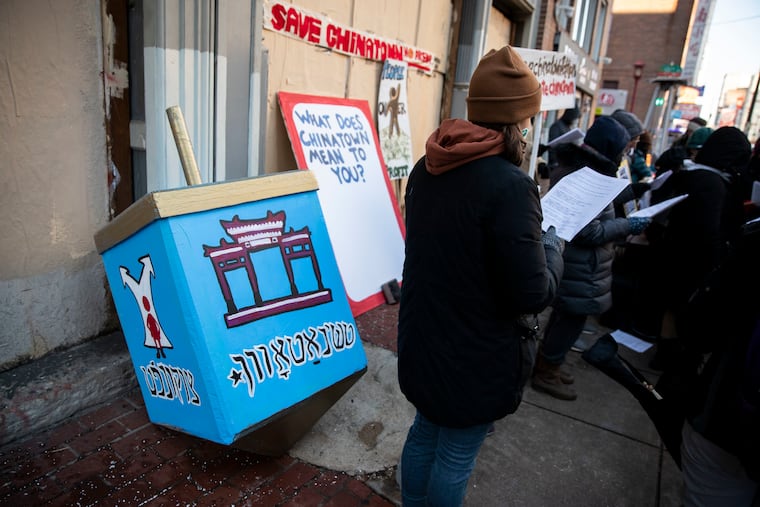Jewish tradition of Christmas in Chinatown this year includes protest of 76ers arena plan
The group sang Christmas carols adapted to highlight the feared impacts of the $1.3 billion 76 Place, which would reach from 10th and Market Streets across Filbert to Chinatown's doorstep.

On Christmas Day, Chinatown’s streets were jammed with double-parked cars and its sidewalks bustled with crowds — many of them Jewish people who have made dim sum brunches or Peking duck dinners their annual holiday tradition.
But on Sunday, which was also the final night of Hanukkah, a group of Jewish faith leaders and community members gathered there for another purpose: to protest what they called a “predatory” plan to build a new Philadelphia 76ers arena at 10th and Market Streets.
The group lit a menorah and sang Christmas carols adapted to highlight the feared impact of the $1.3 billion 76 Place — which would consume the entire city block, sitting above SEPTA’s Jefferson Station and supplanting part of the Fashion District mall, and then sprawl across Filbert Street, devouring the current site of the city’s Greyhound station and looming within half a block of Chinatown’s front door: the Friendship Gate at 10th and Arch Streets.
“This is a community that has fought back over 50 years more than 12 different fights. And every time, this community has won,” said Debora Kodish, a West Philadelphia resident who wore a “no chazzers” pin (she translated it from Yiddish as “don’t be a pig”). “This is the last community of color in Center City and one of the last vibrant Chinatowns on the East Coast. We should be prepared to fight for that.”
The group was joined by longtime Chinatown residents, business owners, and activists. While some Chinatown leaders have expressed cautious optimism about the proposal, those protesting said there are widespread concerns about the rent pressures, traffic jams, parking chaos, and, ultimately, displacement that they fear will accompany the arena.
They derided what they said had so far been an insufficient, opaque, and deceptive community-engagement process — and pledged to fend off the arena as they did a proposed Phillies stadium in 2000 and a casino plan pitched by Foxwoods in 2008.
“This arena is going to destroy Chinatown as a community,” said Michael Zhang, who grew up in Washington, D.C.’s, Chinatown. He said he saw how the construction of an arena there hollowed out that community, leaving little more than Chinese characters on franchise shops and restaurants. After moving to Philadelphia, he said, his family found an intact Chinatown where they could live, do business, attend church, and offer translation services to assist newer arrivals.
Developer David J. Adelman previously told The Inquirer that the “new shiny arena” would be Philly’s “own Madison Square Garden” when it opens in 2031, seating 18,500 and housing a self-contained entertainment district with restaurants and retail at street level.
The proposal also includes a $50 million community benefits agreement, distributed over 30 years.
Zhang, however, said that agreement amounted to “gaslighting.”
Kodish said she got involved after receiving a phone call from Debbie Wei, founder of Asian Americans United.
Adelman was being honored by the Jewish Federation of Greater Philadelphia, and Wei wanted to know whether Jewish community members would speak out. Kodish quickly assembled a group to call out the arena plan as a “shonda” — a shame, in Yiddish.
“This is not just about Chinatown,” Wei said. “This is about the whole community and what our vision for the city is.”
Kodish pointed out that the Jewish community’s connection to Chinatown is a longstanding one.
Chinese food has been a vital part of American Jewish culture — especially on Christmas — going back at least to the 1930s. And for decades, Philadelphia’s Chinatown was home to vegetarian restaurants that advertised their food as Kosher.
At the protest on Sunday, Rabbi Linda Holtzman of the Tikkun Olam Chavurah community led a menorah lighting — noting that the Jewish holiday, “a festival of resistance” against all odds, was the perfect moment to join Chinatown community members in resisting the arena complex.
Organizers also brought a four-foot-high dreidel — whose four sides, lettered in Hebrew, read: “Chinatown,” “Arena,” “Yiddish,” and “Future.” Each spin was meant to spark discussion, organizers said. They urged passersby to sign a petition and passed out postcards to send to City Council members, urging them to oppose the arena. They reinterpreted the Jewish folksong “Hava Nagila” as “Have a Nice Eggroll.”
Sam Sam, the owner of Little Saigon Cafe and the founder of a group called Concerned Citizens of Chinatown, said he appreciated the support and would like to see more communities stepping up to oppose the arena proposal.
He does not believe that Chinatown could survive six years in a construction zone, let alone the impact once the arena was up and running.
“These developers want to divide our community,” he said. But he believes the community is united in opposition. “There are not many Chinatowns like Philadelphia’s Chinatown. We’ve been here for 150 years.”